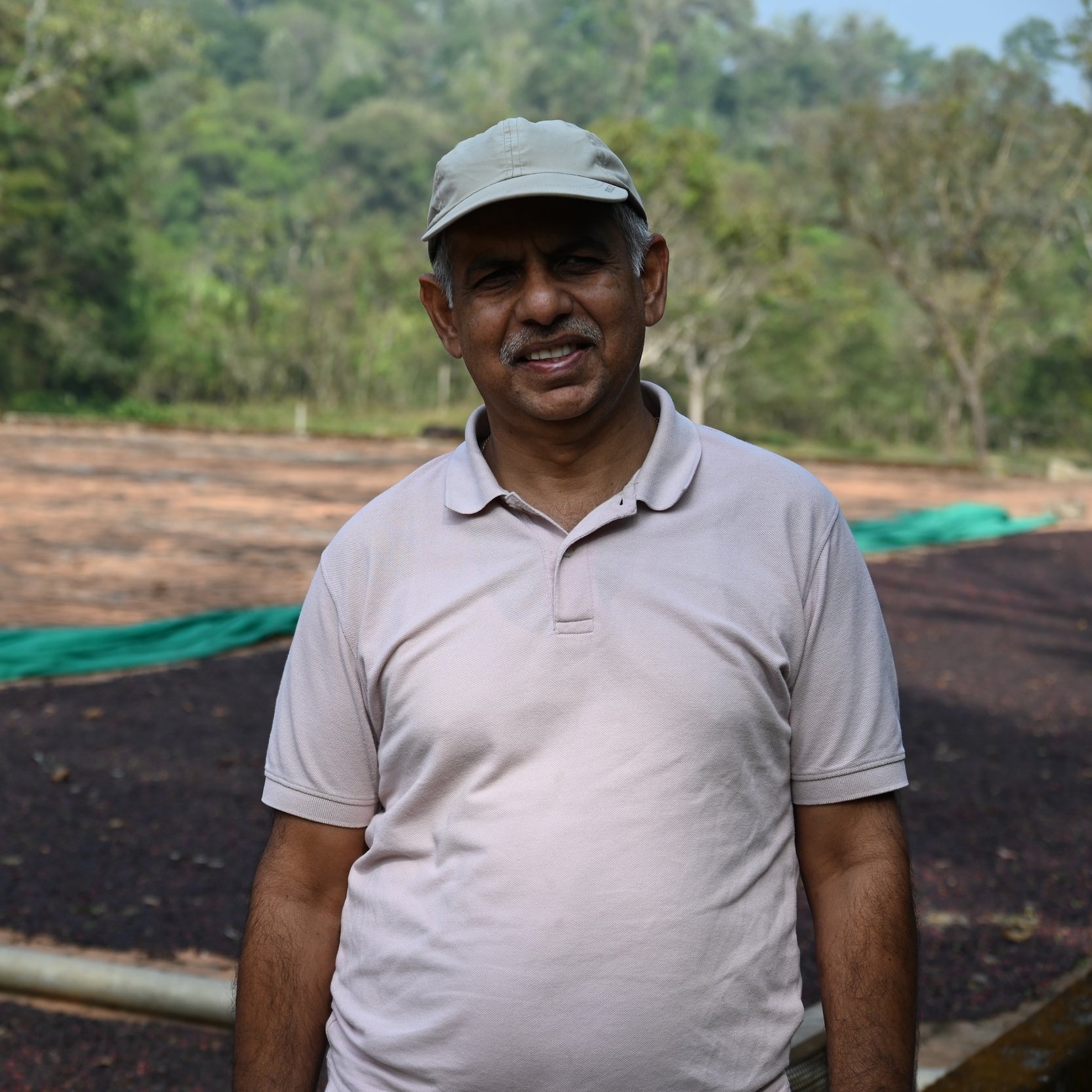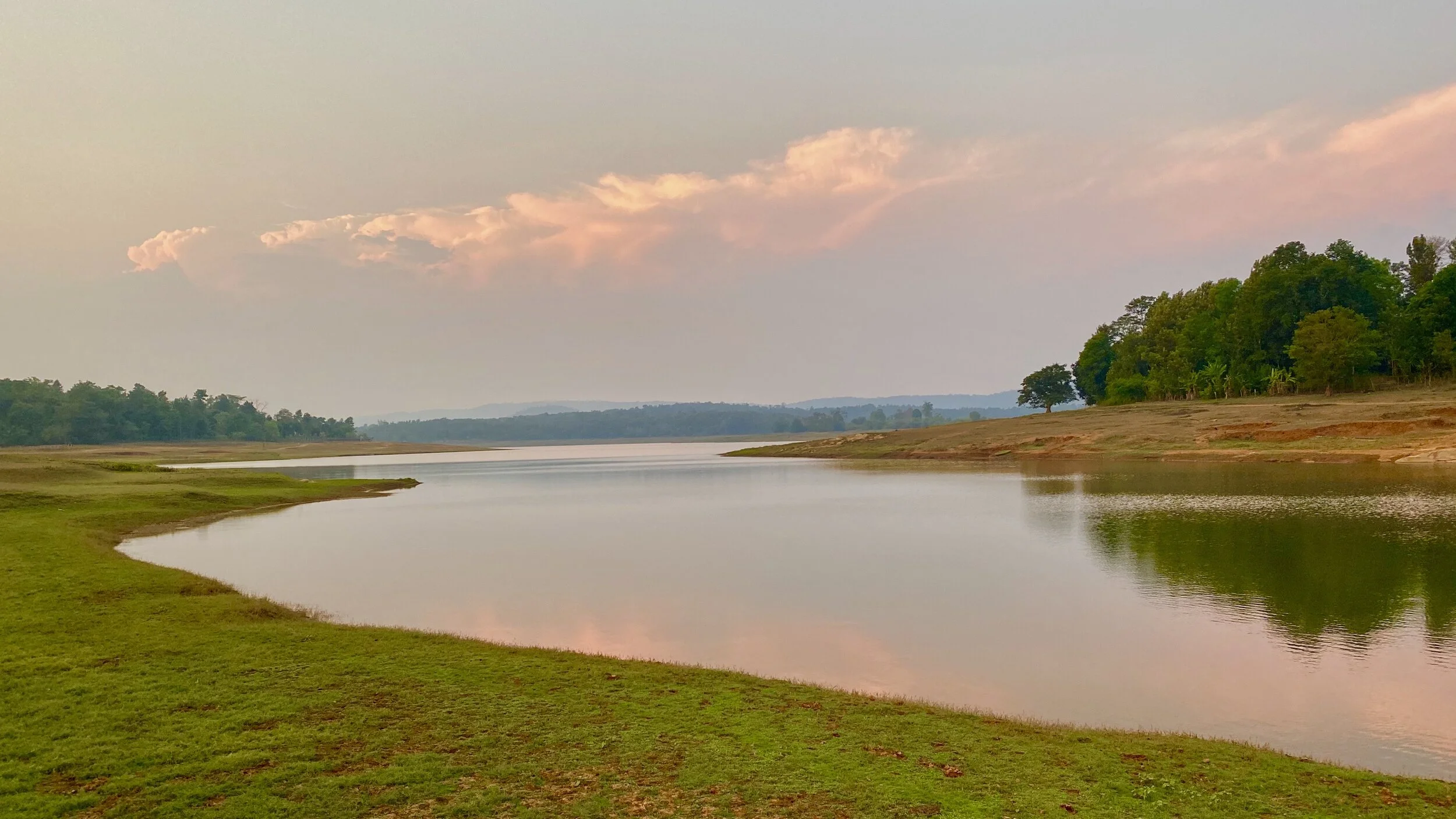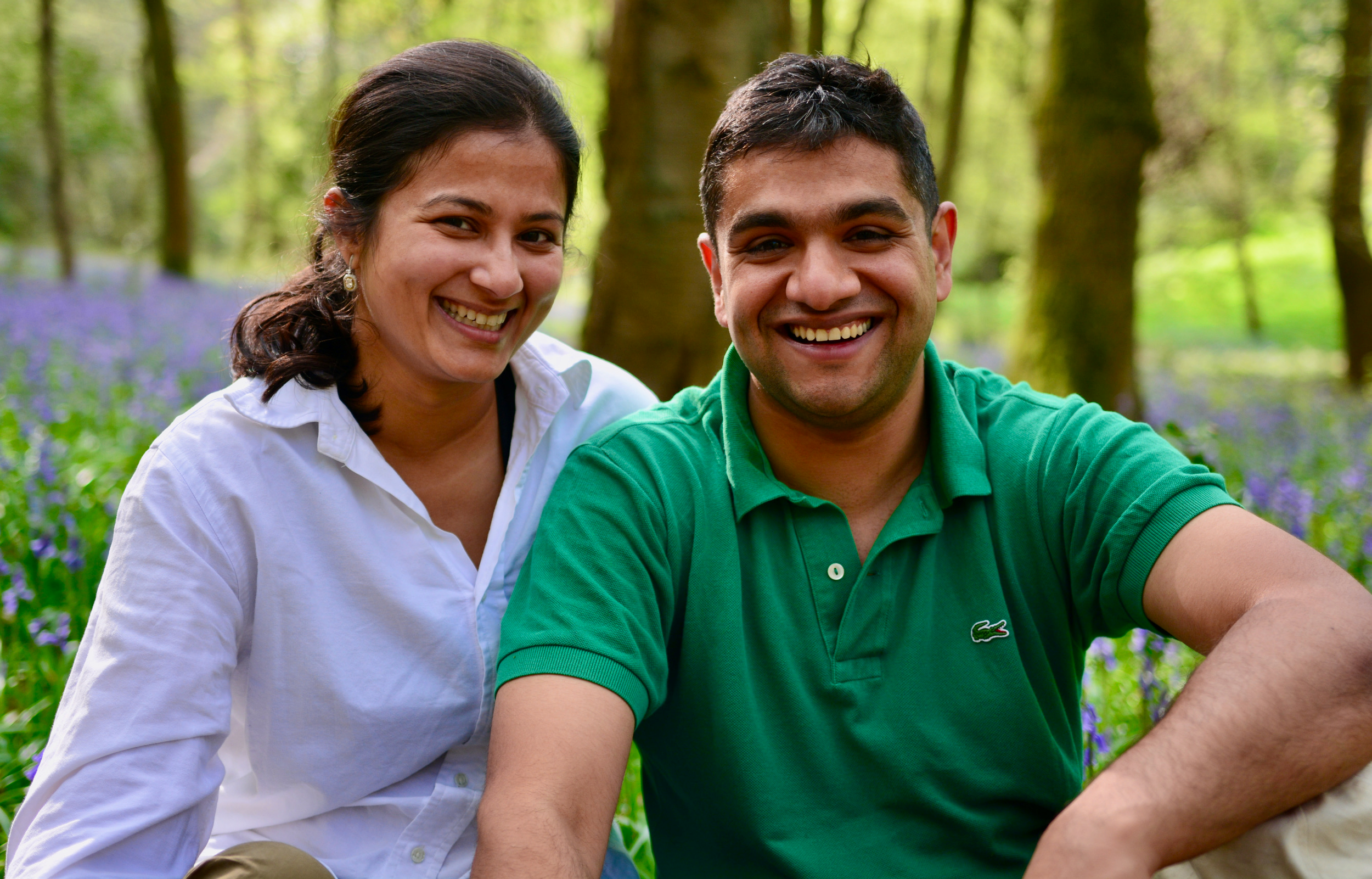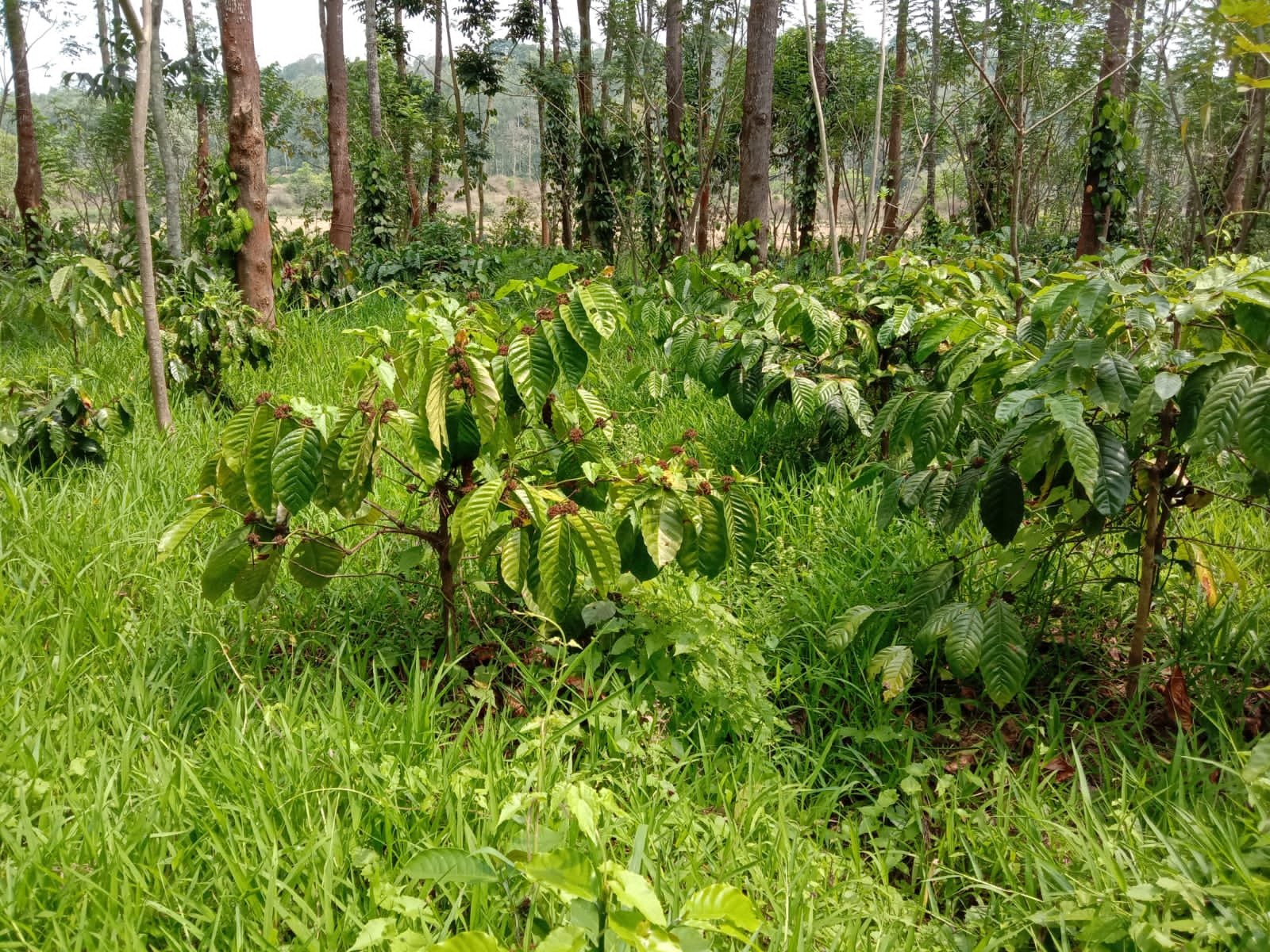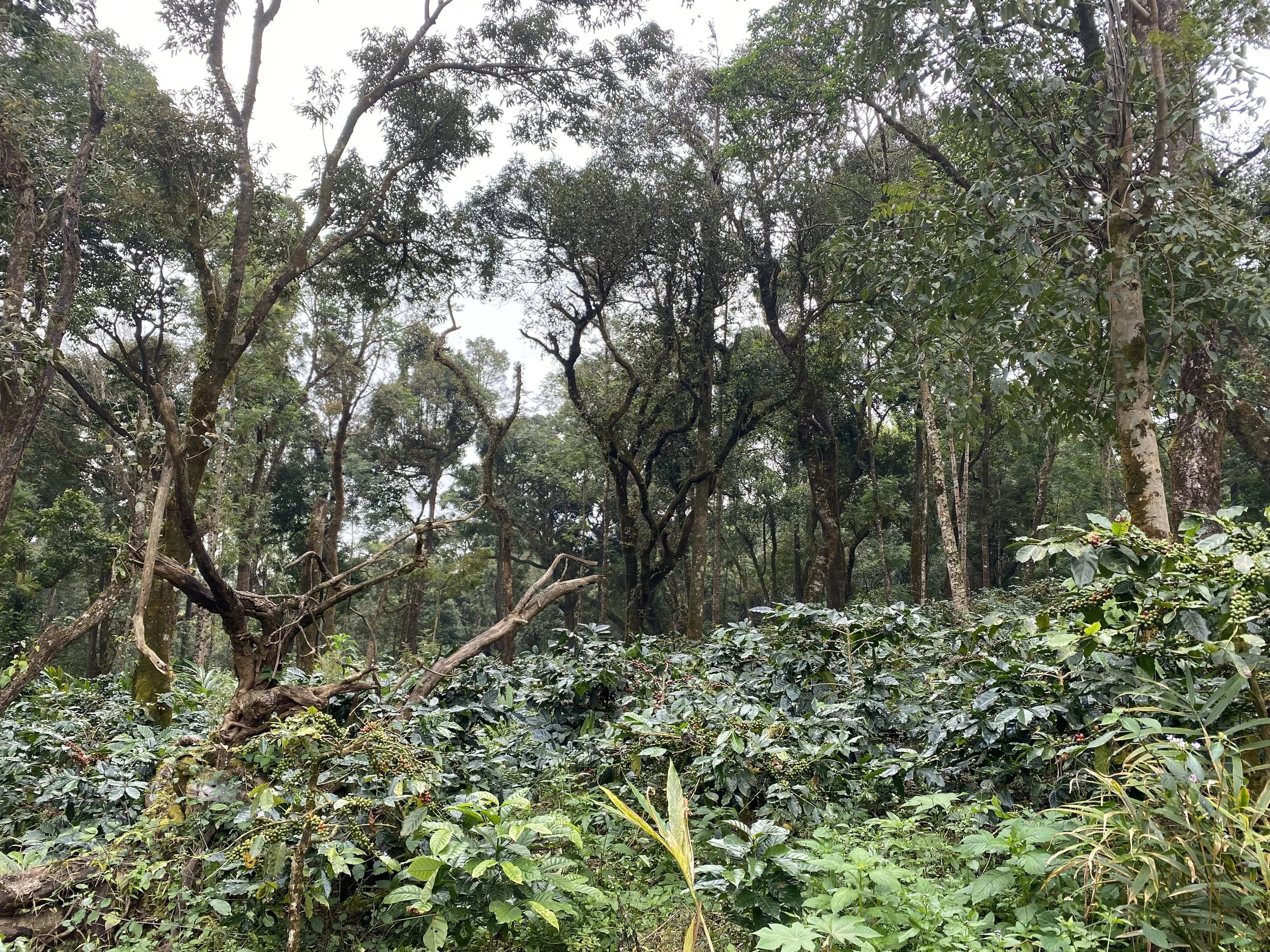Making coffee work for rural India
Indian coffee has been on our wish list for a very long time because of an incredible mix of properties we saw at some estates: advanced processing knowledge, a history of developing not only specialty arabica but robusta as well - combined with high ethics and business efficiency. You find yourself wondering how this country is not top of mind for more coffee roasters out there.
We admire our partners Komal and Akshay’s resolve to make coffee a viable way of living for themselves and the region. After their time in the UK, Komal and Akshay came back to Akshay’s family farm in India to restore it and seek alliances with a wide range of very diverse growers in the region. "We were not only looking for partners," says Komal "we were looking for passionate coffee growers that understand the complexities involved in this trade." With low prices and people leaving farms to work in cities, their proposition has to be based on higher prices and innovations: both technological as in terms of (regenerative) agriculture). Through hard work and a firm resolve they are proving that through coffee, a better future is possible for the people in their region and for the environment.
These are the estates Komal and Akshay brought together for the 2023 season.
More than anything, Komal and Akshay work with like-minded individuals who actively fight global warming by implementing unique models that always put the soil and the ecosystem first. Their goal is to help their partners achieve consistent prices year on year, so they can invest back in the fields.
mooleh manay
Komal and akshay Sable
acres: 75
trees: 50,000
workers: 7
seasonal workers: 40-74 (70% women)
bags bought: 63
craigmore Kattimattu
Farokh Anklesaria
acres: 52 (42 cultivated)
trees: 28,000
workers: 23
seasonal workers: 12 (75% women)
bags bought: 40
SRirANGALLI COMMUNITY
Community of farmers
acres: 1-8 acres per farmer
farmer families: 8
trees: 7000
workers: community and SICC workers
bags bought: 54
VENKIDS VALLEY
Pavan & Shilpa Nanjappa
acres: 170
trees: 127,500
workers: 8
seasonal workers: 20 (60% women)
bags bought: 150
hardoor estate
Mukul Mahaindra
workers: 85
bags bought: 2
Upper Udaya and Beetigundi Estates
bino george
acres: 105
trees: 46,200
workers: 32
bags bought: 60
THIS SIDE UP VALUE CHAIN :
CULTIVARS :
Coffea canephora (robusta): congensis and old peredinia; Arabica (S795, Catuai, SLN6, Chandragiri), Robusta (congensis, old peredina & S274) and Excelsa.
ALTITUDE :
985 to 1400 meters above sea level.
NOTABLE :
This year, Komal and Akshay gathered coffee from producers in the area that shared their vision and aimed to join forces in the regenerative, environmental and social projects they develop in the area.
PROCESSING :
Ripe cherries are picked and brought back from the farms everyday, we then floated the coffees, fermented for 2 days and then put them on raised beds in polytunnels to dry.
Key Achievements :
2020 : Met Komal and Akshay via Instagram, at the very start of the pandemic after Lennart’s return from Chikmagalur. First import late in the season to account for our need for more specialty robusta.
2021 :.import of Venkids Valley and some small lots from Mooleh Manay. SICC are redefining what the European market can do with high quality robusta, and talks start about importing high quality arabica and excelsa.
2022 : Massively updated and expanded portfolio, including single farmer and community lots. People are astounded by the arabica’s produced by SICC’s partners, Craigmore is used in the Dutch Brewer’s Cup.
2023: Five new producers join our project through SICC. This means widening our vision and shared purpose with like-minded individuals who are already doing so much to fight global warming, increase farmers' livelihoods, and offer great coffee to the world. South India Coffee Company is becoming a pioneer in sustainable technology, standing at the forefront of soil analysis, installing a huge solar irrigation system, a bee project, and an ambitious economic viability program with profitability per acre compared to profitability per crop.
The Price you pay : €7,58
mooleH manay natural robusta: €5,49
The price we paid Komal and Akshay a for natural robusta as wet parchment. The prices paid for the other coffees as wet parchment were:
Venkids Valley - Washed Robusta: € 4,52
Venkids Valley - Natural Robusta: € 4,52
Mooley Manay - Honey Sundried: € 4,47
Mooleh Manay Estate Lot - Black Honey Sundried Excelsa: € 4,98
Srirangalli Community Lot - Natural Robusta: € 2,88
Venkids Valley Estate Lot - Washed Robusta:€ 3,67
Craigmore Kattimuttu Estate Lot - Washed Arabica: € 6,36
Kanbile Estate Lot - Washed Robusta: € 3,40
Venkids Valley estate lot - natural robusta: € 7,84
Sirangalli community lot - natural arabica: € 2,97
Sirangalli community lot - natural robusta: € 6,86
Krishnagiri estate lot - natural arabica: € 3,01
South india coffee company : €2,48
Mooleh Manay does the post harvest processing for itself and Srirangalli Community. Venkids, Craigmore, and Kanbile have their own drying yards. SICC does the dry milling for all the estates. The margins included for this year’s lots were respectively:
Venkids Valley - Washed Robusta: € 0,82
Venkids Valley - Natural Robusta: € 0,58
Mooley Manay - Honey Sundried: € 0,67
Mooleh Manay Estate Lot - Black Honey Sundried Excelsa: € 1,79
Srirangalli Community Lot - Natural Robusta: € 1,37
Venkids Valley Estate Lot - Washed Robusta: € 0,96
Craigmore Kattimuttu Estate Lot - Washed Arabica: € 2,06
Kanbile Estate Lot - Washed Robusta: € 1,23
Venkids Valley estate lot - natural robusta: € 2,48
Sirangalli community lot - natural arabica: € 2,48
Sirangalli community lot - natural robusta: € 2,48
Krishnagiri estate lot - natural arabica: € 2,48
SHIPPING : €1,17
International shipping from Mumbai to Rotterdam + customs and local costs. We bought this coffee “CIF Rotterdam” from SICC, meaning they were responsible for the international freight and we cleared the coffee past customs and offloaded it at our warehouse.
THIS SIDE UP : €1,55
This Side Up compensation for spending time and resources importing this coffee. Our work includes year-round contact with producers, managing export, shipping, import, warehousing, quality control, sampling, finding and keeping roasting partners for SICC. €1,55 is This Side Up highest margin, for a full overview of what we do to earn our margin, see the Trade Models page.
FINANCING : €0,28
Financing cost. We paid SICC in three instalments so they in effect partly helped us finance this coffee. This is our average financing cost.
REGENERATION : €0,06
A standard TSU premium on all coffees designated exclusively to accelerate farmers’ own regenerative agriculture projects. Komal will spend the 2023 premium on native plant seedlings for the neighbouring communities and an organic fertiliser setup.
AVAILABLE FROM SICC :
Mooleh Manay estate lot – natural robusta
Mooleh Manay estate lot – natural arabica
Mooleh Manay estate lot – natural yeast fermented robusta
Venkids Valley estate Lot – washed robusta
Mooleh Manay estate lot – honey sundried robusta
Venkids Valley estate Lot – natural robusta
Srirangalli community lot – natural arabica
Srirangalli community lot – washed arabica
Kanbile estate lot – washed robusta
Krishnagiri estate lot – natural arabica
Craigmore Kattimuttu estate lot – natural robusta
Craigmore Kattimuttu estate lot – honey sundried robusta
Hardoor estate lot – honey sundried arabica
Ghattadahally estate lot - washed arabica
Narmada estate lot – washed arabica
RECOMMENDED IKAWA PROFILEs:
In 2022 we made a new profile for washed coffees named TSU Washed 2022, which has a drop temperature of 145 degrees Celsius and an end temperature of 208. Both the washed arabicas and black honey excelsa by SICC and their partners work beautifully with this profile. For all the robusta’s, whether they are washed, semi-washed or natural, we recommend our standard TSU Robusta profile which has a very low ROR up to the middle of the roast to keep the more brittle robusta from overdeveloping too soon.
CONTACT SICC :
Komal and Akshay are very keen to meet roasters and all lovers of her coffee and regularly features them on her beautiful instagram channel. Get in touch with her for any inquiries about any of the estates and communities they work with.
CONTACT Komal and Akshay Dashrat
EMAIL komal@sicc.coffee
TEL +91 99701 98003
FACEBOOK / INSTAGRAM
Nakur Shirangala, Coorg, Karnataka, India











